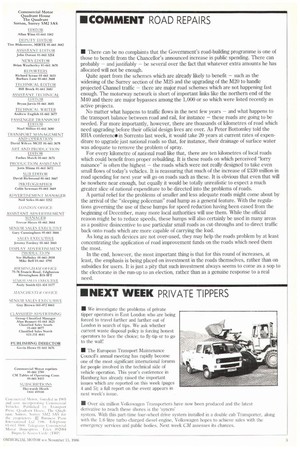• There can be no complaints that the Government's road-building
Page 5

If you've noticed an error in this article please click here to report it so we can fix it.
programme is one of those to benefit from the Chancellor's announced increase in public spending. There can probably — and justifiably — be several over the fact that whatever extra amounts he has allocated will not be enough.
Quite apart from the schemes which are already likely to benefit — such as the widening of the Surrey section of the M25 and the upgrading of the M20 to handle projected Channel traffic — there are major road schemes which are not happening fast enough. The motorway network is short of important links like the northern end of the M40 and there are major bypasses among the 1,000 or so which were listed recently as active projects.
No matter what happens to traffic flows in the next few years — and what happens to the transport balance between road and rail, for instance — these roads are going to be needed. Far more importantly, however, there are thousands of kilometres of road which need upgrading before their official design lives are over. As Peter Bottomley told the RHA conference" in Sorrento last week, it would take 20 years at current rates of expenditure to upgrade just national roads so that, for instance, their drainage of surface water was adequate to remove the problem of spray.
For every kilometre of national road like that, there are ten kilometres of local roads which could benefit from proper rebuilding. It is these roads on which perceived "lorry nuisance" is often the highest — the roads which were not really designed to take even small flows of today's vehicles. It is reassuring that much of the increase of 230 million in road spending for next year will go on roads such as these. It is obvious that even that will be nowhere near enough, but equally it would be totally unrealistic to expect a much greater slice of national expenditure to be directed into the problems of roads.
A partial relief for the problems of smaller and less adequate roads might come about by the arrival of the "sleeping policeman" road hump as a general feature. With the regulations governing the use of these humps for speed reduction having been eased from the beginning of December, many more local authorities will use them. While the official reason might be to reduce speeds, these humps will also certainly be used in many areas as a positive disincentive to use particular small roads as cut-throughs and to direct traffic back onto roads which are more capable of carrying the load.
As long as such devices are not over-used, they may help the roads problem by at least concentrating the application of road improvement funds on the roads which need them the most.
In the end, however, the most important thing is that for this round of increases, at least, the emphasis is being placed on investment in the roads themselves, rather than on subsidies for users. It is just a pity that such investment always seems to come as a sop to the electorate in the run-up to an election, rather than as a genuine response to a real need.






























































































